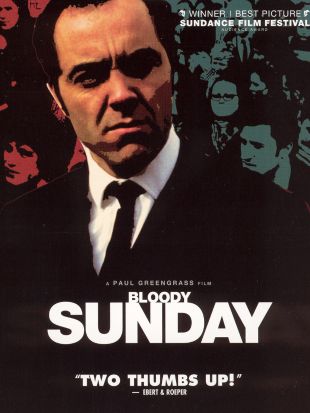
Paul Greengrass' Bloody Sunday has been a film festival favorite, and received a good deal of critical praise, but despite the importance of the subject matter and the visceral power of Greengrass' filmmaking, the film is far from flawless. Greengrass has cited Gillo Pontecorvo's The Battle of Algiers as an inspiration for his film, the earlier film's influence is evident in Bloody Sunday's vérité style and his use of non-actors in many of the smaller roles. Greengrass' background as a documentarian is also evident in the film's use of handheld camera and a chaotically realistic sound mix. But the film's considered approach to its subject matter is too calm and thoughtful for agitprop, and the thinness of its characterizations makes it a failure as straight drama. In the film, the actual massacre is perpetrated, for the most part, on nameless, faceless characters, in the style of the opening battle sequence in Saving Private Ryan. But Spielberg's decision to begin his depiction of a huge war with carnage amid anonymous soldiers is much more understandable than Greengrass' decision not to differentiate among the 13 unfortunate victims of this much smaller-scaled tragedy. His decision to inflate the role of Ivan Cooper (James Nesbitt), the Protestant politician and civil rights leader who helped organize what was supposed to be a peaceful march that day, is questionable, particularly as it takes time away from the everyday residents of Derry who should be the film's real story. The film has an undeniable immediacy, and is still a powerful indictment of the British government's actions on that day, and in response to the incident. But one can't help but feel that it could have been something more.
